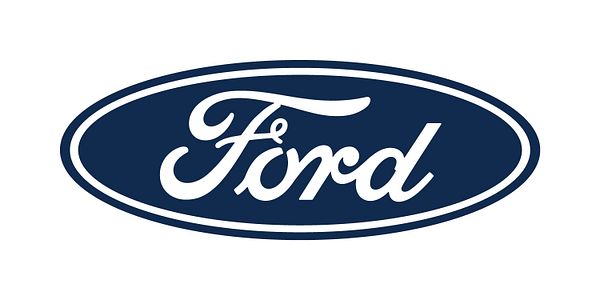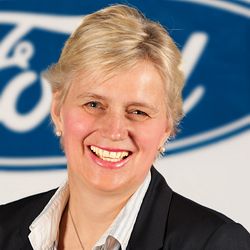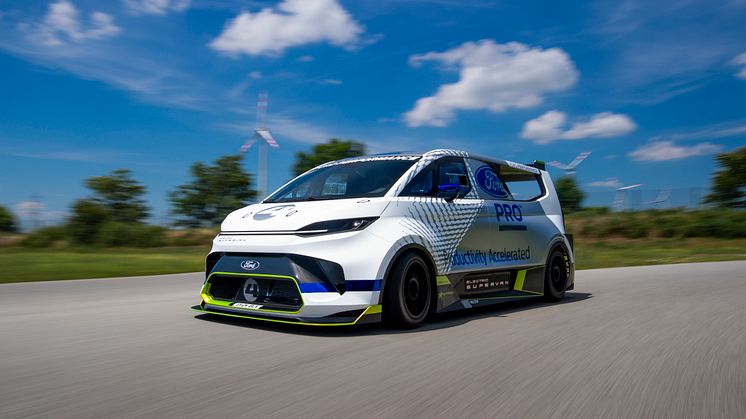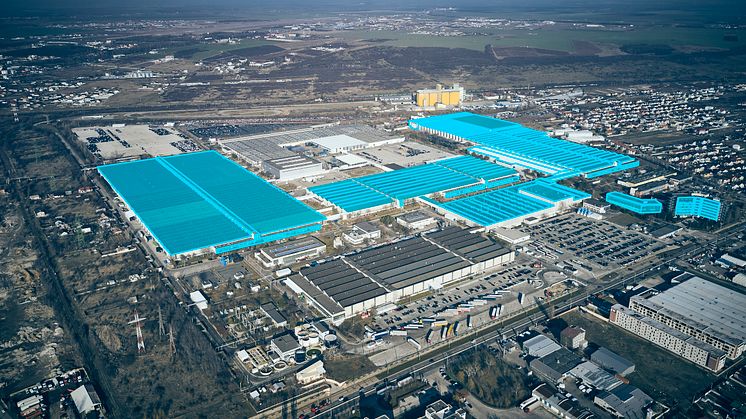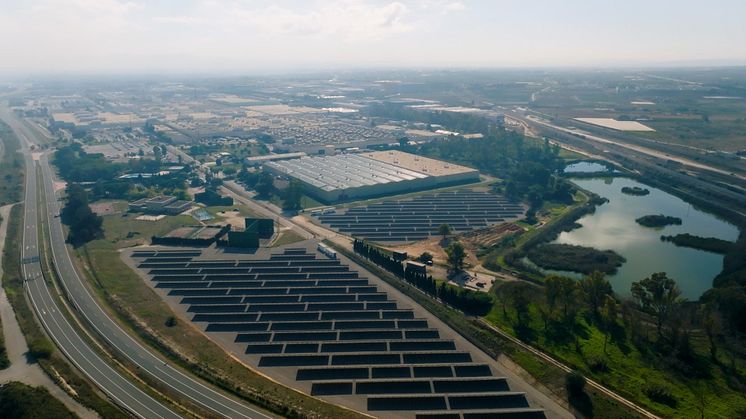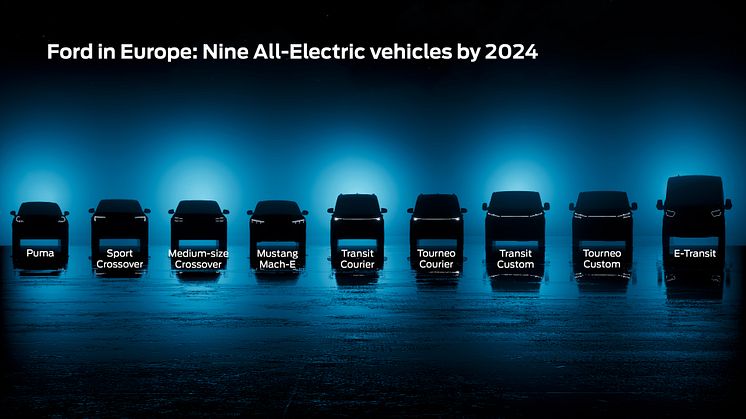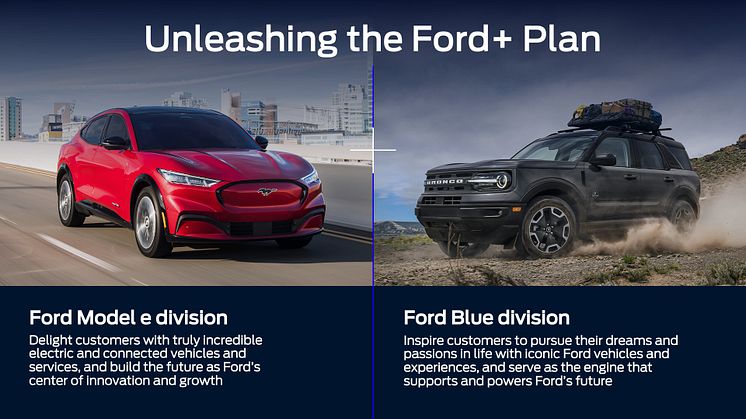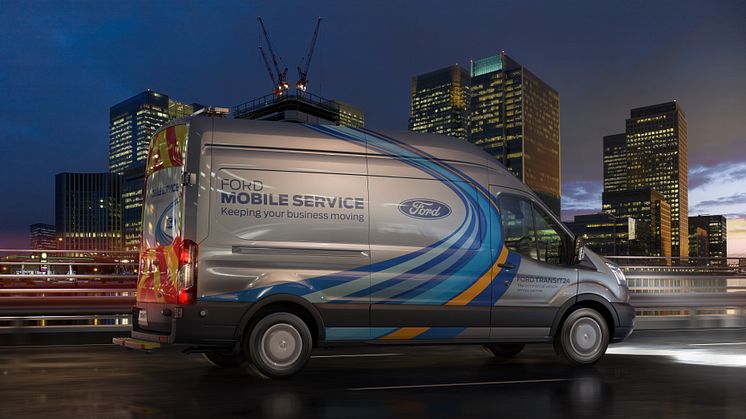
Pressemelding -
Ford speeds toward all-electric, connected future in Europe; chooses Valencia plant, Spain, for next generation EV architechture
- Ford takes next step in its transformation; selects Valencia plant as best positioned to produce vehicles based on a next-generation electric vehicle architecture
- Ford reiterates its commitment to Germany with a $2 billion investment in a state-of-the-art electric vehicle center in Cologne, where production will start in late 2023
- Advances Ford’s goal to achieve zero emissions for all vehicle sales in Europe and carbon neutrality across its European footprint of facilities, logistics and suppliers by 2035
COLOGNE, Germany, June 22, 2022 – Ford in Europe today announced another important stride toward an all-electric future, confirming that it has chosen its plant in Valencia, Spain, as the preferred site to assemble vehicles based on a next-generation electric vehicle architecture. Pending product approval, the Valencia plant could produce breakthrough electric and connected vehicles beginning later this decade.
Ford is also moving forward with a $2 billion conversion of its Cologne, Germany, operations to begin producing electric passenger vehicles starting in 2023. Ford’s European strategy calls for an exciting line-up of electric vehicles, including an electric version of the popular Ford Puma and extending its leadership in the commercial segment with electric Ford Pro vehicles and connected services. By 2026, Ford in Europe plans to sell 600,000 electric vehicles annually.
“We are committed to building a vibrant, sustainable business in Europe as part of our Ford+ plan, and that requires focus and making tough choices,” said Jim Farley, Ford president and CEO. “The European auto industry is extremely competitive, and to thrive and grow we can never settle for less than unbelievably great products, a delightful customer experience, ultra-lean operations and a talented and motivated team.”
Continent-wide electric vehicle sales continue to grow rapidly (up 65% to 2.3 million in 20211) and the European Parliament voted earlier this month to set new CO2 targets for light-duty vehicles, including a requirement that new sales be 100% zero emission vehicles by 2035.
“We are accelerating our transformation in Europe, reimagining how we do business and building a future where amazing vehicles and relentless focus on customer experience goes hand-in-hand with protecting our planet,” said Stuart Rowley, chair, Ford of Europe and chief transformation & quality officer, Ford Motor Company.
“Bringing our all-new electric vehicle architecture to Valencia will help us build a profitable business in Europe, secure high value employment and increase Ford’s offering
of premium electric, high performance, fully connected vehicles that meet the demand of our European customers.
The decision announced today followed the conclusion of comprehensive consultations with teams in Valencia, Spain and Saarlouis, Germany. Ford’s plant in Saarlouis will continue to produce the Ford Focus passenger car, while the company is also evaluating options for future site concepts.
Ford reiterates its commitment to Germany
Ford also today reiterated its commitment to Germany as the headquarters of its European Model e business and the site of its first domestic European electric vehicle production. The state-of-the art Cologne Electrification Centre will start production in late 2023.
“Ford is investing heavily in electric vehicle manufacturing operations in Germany, and we are committed to the country as our headquarters location in Europe,” said Rowley. “We look forward to progressing this work with our partners in Germany and across the whole region. To secure new product in Europe we need winning product designs, outstanding technology and engineering, optimized sourcing and an evolution of our industrial operations to ensure they are fully oriented to an electrified world.”
Next generation architecture a critical component of Ford’s all-electric future in Europe
The next generation architecture is a critical step in the transformation of Ford in Europe to achieve an all-electric future and build a thriving business while making a positive contribution to society and reducing emissions in line with the Paris Climate Agreement.
Ford’s plans for all-electric future in Europe supports the global goal of 2 million+ annual production of EVs by 2026 and 10% company adjusted EBIT margin by 2026.
[1] International Energy Agency Global EV Outlook 2022, May 2022
# # #
About Ford Motor Company
Ford Motor Company (NYSE: F) is a global company based in Dearborn, Michigan, that is committed to helping build a better world, where every person is free to move and pursue their dreams. The company’s Ford+ plan for growth and value creation combines existing strengths, new capabilities and always-on relationships with customers to enrich experiences for and deepen the loyalty of those customers. Ford develops and delivers innovative, must-have Ford trucks, sport utility vehicles, commercial vans and cars and Lincoln luxury vehicles, as well as connected services. Additionally, Ford is establishing leadership positions in mobility solutions, including self-driving technology, and provides financial services through Ford Motor Credit Company. Ford employs about 182,000 people worldwide. More information about the company, its products and Ford Credit is available at corporate.ford.com.
Ford of Europe is responsible for producing, selling and servicing Ford brand vehicles in 50 individual markets and employs approximately 41,000 employees at its wholly owned facilities and consolidated joint ventures and approximately 55,000 people when unconsolidated businesses are included. In addition to Ford Motor Credit Company, Ford Europe operations include Ford Customer Service Division and 14 manufacturing facilities (10 wholly owned facilities and four unconsolidated joint venture facilities). The first Ford cars were shipped to Europe in 1903 – the same year Ford Motor Company was founded. European production started in 1911.
Contact: |
Michael Baumann |
Cristina del Rey |
Ralph Caba |
Ford of Europe |
Ford of Spain |
Ford of Germany |
|
+49-152-54952780 |
+34-616-455712 |
+49-170-3380546 |
|
Cautionary Note on Forward-Looking Statements
Statements included or incorporated by reference herein may constitute “forward-looking statements” within the meaning of the Private Securities Litigation Reform Act of 1995. Forward-looking statements are based on expectations, forecasts, and assumptions by our management and involve a number of risks, uncertainties, and other factors that could cause actual results to differ materially from those stated, including, without limitation:
- Ford and Ford Credit’s financial condition and results of operations have been and may continue to be adversely affected by public health issues, including epidemics or pandemics such as COVID-19;
- Ford is highly dependent on its suppliers to deliver components in accordance with Ford’s production schedule, and a shortage of key components, such as semiconductors, or raw materials can disrupt Ford’s production of vehicles;
- Ford’s long-term competitiveness depends on the successful execution of Ford+;
- Ford’s vehicles could be affected by defects that result in delays in new model launches, recall campaigns, or increased warranty costs;
- Ford may not realize the anticipated benefits of existing or pending strategic alliances, joint ventures, acquisitions, divestitures, or new business strategies;
- Operational systems, security systems, vehicles, and services could be affected by cyber incidents, ransomware attacks, and other disruptions;
- Ford’s production, as well as Ford’s suppliers’ production, could be disrupted by labor issues, natural or man-made disasters, financial distress, production difficulties, capacity limitations, or other factors;
- Ford’s ability to maintain a competitive cost structure could be affected by labor or other constraints;
- Ford’s ability to attract and retain talented, diverse, and highly skilled employees is critical to its success and competitiveness;
- Ford’s new and existing products, digital and physical services, and mobility services are subject to market acceptance and face significant competition from existing and new entrants in the automotive, mobility, and digital services industries;
- Ford’s near-term results are dependent on sales of larger, more profitable vehicles, particularly in the United States;
- With a global footprint, Ford’s results could be adversely affected by economic, geopolitical, protectionist trade policies, or other events, including tariffs;
- Industry sales volume in any of Ford’s key markets can be volatile and could decline if there is a financial crisis, recession, or significant geopolitical event;
- Ford may face increased price competition or a reduction in demand for its products resulting from industry excess capacity, currency fluctuations, competitive actions, or other factors;
- Inflationary pressure and fluctuations in commodity prices, foreign currency exchange rates, interest rates, and market value of Ford or Ford Credit’s investments, including marketable securities, can have a significant effect on results;
- Ford and Ford Credit’s access to debt, securitization, or derivative markets around the world at competitive rates or in sufficient amounts could be affected by credit rating downgrades, market volatility, market disruption, regulatory requirements, or other factors;
- Ford’s receipt of government incentives could be subject to reduction, termination, or clawback;
- Ford Credit could experience higher-than-expected credit losses, lower-than-anticipated residual values, or higher-than-expected return volumes for leased vehicles;
- Economic and demographic experience for pension and other postretirement benefit plans (e.g., discount rates or investment returns) could be worse than Ford has assumed;
- Pension and other postretirement liabilities could adversely affect Ford’s liquidity and financial condition;
- Ford and Ford Credit could experience unusual or significant litigation, governmental investigations, or adverse publicity arising out of alleged defects in products, services, perceived environmental impacts, or otherwise;
- Ford may need to substantially modify its product plans to comply with safety, emissions, fuel economy, autonomous vehicle, and other regulations;
- Ford and Ford Credit could be affected by the continued development of more stringent privacy, data use, and data protection laws and regulations as well as consumers’ heightened expectations to safeguard their personal information; and
- Ford Credit could be subject to new or increased credit regulations, consumer protection regulations, or other regulations.
We cannot be certain that any expectation, forecast, or assumption made in preparing forward-looking statements will prove accurate, or that any projection will be realized. It is to be expected that there may be differences between projected and actual results. Our forward-looking statements speak only as of the date of their initial issuance, and we do not undertake any obligation to update or revise publicly any forward-looking statement, whether as a result of new information, future events, or otherwise. For additional discussion, see “Item 1A. Risk Factors” in our Annual Report on Form 10-K for the year ended December 31, 2021, as updated by our subsequent Quarterly Reports on Form 10-Q and Current Reports on Form 8-K.
Emner
Om Ford Motor Company
Ford Motor Company (NYSE: F) er et globalt selskap med hovedkontor i Dearborn, Michigan, USA som forplikter seg til å skape en bedre verden, hvor alle kan forflytte seg som de vil og følge sine drømmer. Selskapets Ford+ plan for vekst og verdiskapning, kombinerer eksisterende ressurser, nye muligheter og en «always-on» relasjon med kundene som vil berike deres opplevelser og øke kundelojaliteten. Ford utvikler, produserer, markedsfører og har service på sine tilkoblede, og i økende grad elektrifiserte, personbiler og nyttekjøretøy: Fords lastebiler, nyttekjøretøy, personbiler og Lincolns luksusbiler. Selskapet har som mål å ha en ledende rolle innen elektrifisering, tilkoblede tjenester og mobilitetsløsninger, inkludert selvkjørende biler og finansielle tjenester gjennom Ford Motor Credit Company. Ford har cirka 183.000 ansatte over hele verden. For mer informasjon om Ford, deres produkter og Ford Motor Credit Company, vennligst se www.corporate.ford.com
Ford Europa er ansvarlig for å produsere, selge og vedlikeholde Ford kjøretøy i 50 markeder og har ca. 41.000 ansatte ved sine heleide anlegg og konsoliderte fellesforetak. De har rundt 55.000 ansatte når ikke-konsoliderte virksomheter er inkludert. I tillegg til Ford Motor Credit Company inkluderer Ford Europas virksomhet Ford Servicemarked og 14 produksjonsenheter (hvorav 10 er heleide anlegg og 4 er ukonsoliderte fellesforetak). Den første Ford-bilen ble sendt til Europa i 1903 – samme år som Ford Motor Company ble etablert. Produksjon i Europa startet i 1911.
Ford Motor Norge er en bilprodusent og mobilitetsselskap som importerer biler og deler for salg gjennom et forhandlernettverk på 82 salgs- og servicepunkter. Den første Ford-bilen kom til Norge allerede i 1906, trolig gjennom firmaet E.C. Gjestvang i Oslo. Lenge var det kun private forhandlere som importerte Ford til Norge via Danmark. Først i 1960 ble Ford Motor Norge etablert etter sterkt engasjement fra blant annet Trygve Lie, FNs første generalsekretær og norsk ambassadør i Washington.
